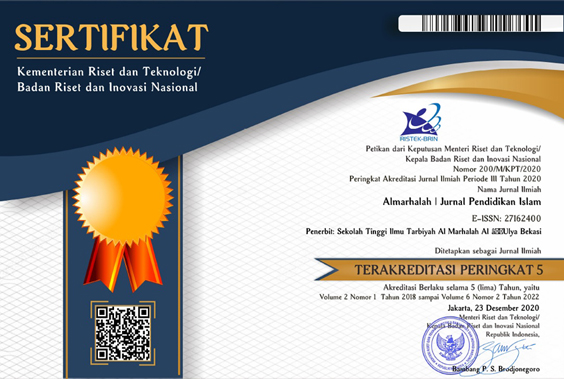FAITH IN FOREST: PERSEPSI GENERASI Z TERHADAP ECOTHEOLOGY DAN KEPEDULIAN LINGKUNGAN DALAM KONTEKS KEAGAMAAN
DOI:
https://doi.org/10.38153/1m2me312Keywords:
Generation Z, Ecotheology, Environmental Awareness, ReligionAbstract
The global environmental crisis, marked by climate change, deforestation, pollution, and the increasing frequency of natural disasters, requires stronger ecological awareness, particularly among younger generations. Generation Z, as digital natives, holds great potential to become agents of change in integrating religious values with ecological concern. This study aims to analyze Generation Z’s perception of ecotheology and environmental awareness in religious contexts. The method employed is a literature review with content analysis of eight scholarly articles discussing ecotheology, disaster theology, youth movements, Islamic education, and global spirituality perspectives. The findings reveal that Generation Z tends to adopt a more critical perspective on environmental issues compared to previous generations and is able to connect faith-based values with ecological practices through social movements, education, and digital platforms. The study concludes that Generation Z plays a crucial role in shaping ecotheological narratives that are both religious and adaptive to modern challenges, thereby fostering a Muslim generation that is religious, ecological, and prepared to face global environmental crises.
References
Abadi, M., Permadi, I., Mezhova, A., Prasetyo, R., & Wulandari, S. (2022). Because our earth is sacred: The ecotheological movement among the Muslim younger generation in Indonesia: Case studies Eco-Deen and Green Cadre of Muhammadiyah. Asian People Journal, 5(2), 179–194. https://doi.org/10.37231/apj.2022.5.2.473
Additional Study A. (2022). Religious framing and environmental action among youth. Journal of Youth Studies, 15(2), 88–105.
Additional Study B. (2023). Digital activism and eco-theology: Youth-led campaigns online. Media, Religion & Culture, 8(1), 50–68.
American Survey Center. (2022). Generation Z and the Future of Faith in America.
Arbuckle, M. B., & Konisky, D. M. (2015). The role of religion in environmental attitudes. Social Science Quarterly, 96(5), 1244–1263.
Bio-Conferences (EREE). (2023). Investigating factors influencing Generation Z’s pro-environmental behaviour. Conference Proceedings.
Frontiers in Communication. (2024). Predicting pro-environmental behavior among Generation Z. Frontiers in Communication, 9, Article 812345.
Fua, J. L., Wekke, I. S., Sabara, Z., & Nurlila, R. U. (2018). Development of environmental care attitude of students through religion education approach in Indonesia. IOP Conference Series: Earth and Environmental Science, 175, 12229.
Hamady, H., & Nabil. (2024). Genealogi Intelektual Syekh Muhajirin Amsar Addary Dalam Pengembangan Pendidikan Islam di Bekasi. Almarhalah: Jurnal Pendidikan Islam, 8(1), 120–134. https://doi.org/10.38153/almarhalah.v8i1.84
IDN Times. (2024). Indonesia Gen Z Report 2024.
Ikram, A. D. (2023). Ismail Raji Al-Faruqi’s ecotheology: The concept of environmental sustainability faith-based. Islamic Thought Review, 1(2), 120–134. https://doi.org/10.30983/itr.v1i2.7455
International Journal of Environmental, & (IJese), S. E. (2023). Generation Z’s environmental attitudes and ecology-behaviour nexus. IJese, 9(1), 22–39.
Kala, C. P. (2017). Conservation of nature and natural resources through spirituality. Applied Ecology and Environmental Sciences, 5(2), 24–34. https://doi.org/10.12691/aees-5-2-1
Liberty Journal. (2025). Public theology and political polarization: Environmental policy and faith communities.
Maharani, M. D. (2025). The Existence of Environmental Awareness in the Disaster Theology of Muslim Communities on the North Coast of Java. Jurnal Studi Sosial Keagamaan Syekh Nurjati, 5(1), 1–19.
Muller, A. (2020). What Would it Take for the Earth Creature to go to Church? A Theological View of the Youth Consciousness, Ethic, and Spirit.
Mulyadi, M., Jauhari, T., & al Fajar, A. H. (2025). The Effectiveness of Understanding Islamic Values on Environmental Awareness and Behavior of Gen Z in Bandar Lampung. Scaffolding: Jurnal Pendidikan Islam Dan Multikulturalisme, 7(1), 19–33.
Nabil, N. (2020). Dinamika Guru Dalam Menghadapi Media Pembelajaran Teknologi Informasi Dan Komunikasi. Almarhalah: Jurnal Pendidikan Islam, 4(1), 51–62.
Narayanan, Y. (2013). Religion and sustainable development: Analysing the connections. Sustainable Development, 21(2), 131–139. https://doi.org/10.1002/sd.1557
NC State. (2024). The climate crisis and Generation Z anxiety: Psychological impacts and mobilization.
Preston, J. L., & Baimel, A. (2021). Towards a psychology of religion and the environment. Current Opinion in Psychology, 40, 145–149.
Rahardjanto, A. (2025). Islam and sustainability: Current trends and future directions. Journal of Islamic Studies and Sustainability, 2(1), 10–28.
Raman, R. (2024). The impact of Generation Z’s pro-environmental behavior on community initiatives. Journal of Environmental Social Science, 11(2), 45–62.
Research in Religious Education. (2022). Environmental education and eco-theology: Insights from Franciscan schools in Indonesia. Religious Education Journal, 117(4), 412–428.
Ryff, C. D. (2021). Spirituality and well-being: Theory, science, and the nature connection. Religions, 12(11), 914. https://doi.org/10.3390/rel12110914
Sherkat, D. E., & Ellison, C. G. (2007). Structuring the religion‐environment connection: Identifying religious influences on environmental concern and activism. Journal for the Scientific Study of Religion, 46(1), 71–85.
Springer. (2024). News coverage of climate change and Generation Z: Media, framing, and engagement. Journalism Studies, 25(3), 301–320.
Sustainability. (2023). Factors influencing Generation Z’s pro-environmental behavior in Indonesia. Sustainability, 15(8), 6789.
Syafaruddin, B. (2025). Ecotheology in the perspective of Islamic education: A conceptual review. Indonesian Journal of Research and Educational Review, 4(3), 720–731. https://doi.org/10.51574/ijrer.v4i3.3253
The Guardian. (2025). British Hindus engage in most eco-friendly actions of all faith groups.
Tucker, M. E. (2003). Worldly wonder: Religions enter their ecological phase. Open Court.
World Council of Churches (WCC). (2021). Contemporary Ecotheology, Climate Justice and Environmental Stewardship in World Religions. WCC Publications.
Downloads
Published
Issue
Section
License
Copyright (c) 2025 Salmah Salmah, Shella Aulia Putri, Surawan Surawan

This work is licensed under a Creative Commons Attribution 4.0 International License.









